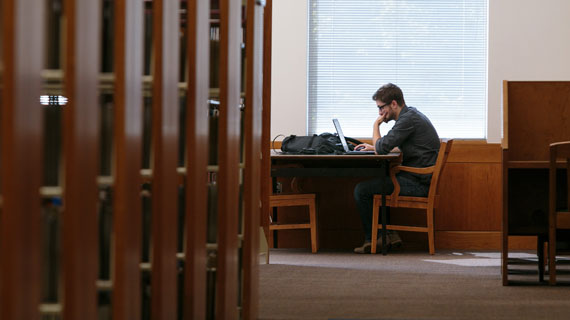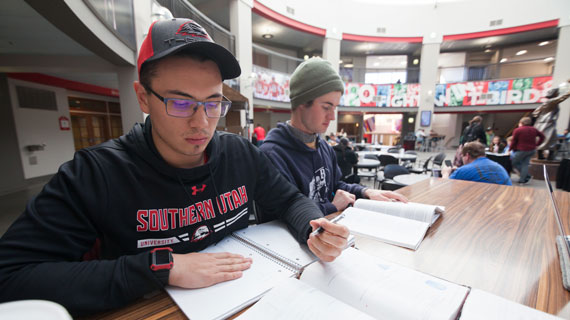14 Study Hacks for College Students During Finals Week
Posted: December 12, 2018 | Author: Southern Utah University | Read Time: 4 minutes
 It’s that stressful time of year when college students are struggling to finish projects, prepare presentations and study for final exams. Months of learning and hard work all lead up to this final test or project. No pressure, right?
It’s that stressful time of year when college students are struggling to finish projects, prepare presentations and study for final exams. Months of learning and hard work all lead up to this final test or project. No pressure, right?
“Students have worked and studied hard all semester for this moment,” said Brandon Street, director of SUU's Career and Professional Development Center. “Finals Week is their time to shine. We have all the confidence in you!”
Tips and Tricks to Help You Conquer Finals Week
Find a quiet study spot on campus
While the library is most people’s go-to spot, it can get super busy the last few weeks of the semester. Truth is, sometimes you only need a desk, comfy chair, an outlet and some peace and quiet. Computer labs in different academic buildings work well, as do empty lecture halls or classrooms.
Always pack the essentials
Finding a good spot to study can be a commodity, so do what you can to secure your ideal study space for as long as humanly possible. Bring supplies like a laptop, chargers (phone and laptop), water bottle, snacks, layers of clothing, headphones, notes, pens and highlighters, and a notebook.
Googling “site:edu [subject] exam” is a life-saver
You can search for old tests from hundreds of universities on the exact topic of your course, allowing you to see how certain concepts could possibly be used in a test question.
Eat healthy foods
Don’t take the easy way out with junk food or energy drinks to ‘keep energy levels up’. You’ll hands-down have more energy by eating a well-balanced diet, including foods like fish, eggs, dark leafy greens, peanut butter, and fruit.
Use the Pomodoro method to study
If you struggle focusing for long study sessions, set a timer for 25 minutes. During that time, focus purely on studying (aka NO cell phones). When the timer goes off, take a five-minute break to walk around, check your phone and get a snack. Shake things off and then start with another 25-minute study session. The idea is to maximize your ability to focus while minimizing brain fatigue.
Listen to music without lyrics while you study
This will keep you focused on the material instead of on someone’s voice in your earbuds.
Use mnemonic devices to memorize important material
The quirkier and sillier the better! You probably learned ‘Please Excuse My Dear Aunt Sally’ in grade school, but it still jogs your memory when hearing it. Mnemonics work!
Wear pajamas or workout clothes
The degree of comfiness directly correlates to the effectiveness of your studies. This isn’t scientifically confirmed, but we’d wager most students would stand behind that statement (and wear a hoodie and sweats while doing it!).
Stay active
Most studying happens in front of a book or computer, so break up the routine by moving while you study. Read on a treadmill, practice yoga during your study breaks or follow along with short workout videos on YouTube every few hours. Moving around often will keep you focused and energized. (Plus, if you followed tip #8, you may already be dressed in workout gear!)
Prepare a note card — even if you can’t bring it into the test
Write down all the relevant information you can think of on this card. This practice will help you remember important information.
Write down all the formulas before you take the test
When you finally sit down with your math test, write down every formula you studied in the top margin. This allows you to focus on the material and how the numbers work together instead of trying to remember the correct variable structure.
Sleep is the key
Your body needs sleep to function at optimum levels. Set a bedtime alarm to ensure you aren’t studying late into the night. You should be getting enough sleep that you can wake up each morning feeling well-rested.
Utilize campus resources
You pay student fees for a reason. Use resources like the Tutoring Center, Writing Center, and your professor’s office hours to your advantage. These are all available to help you succeed as a student, so use them.
Set a few achievable goals for the day and know when to stop
College burnout is real. Set realistic goals and know your limits and reward yourself when you reach your goals. Remember: college is a marathon, not a race.
Elle Woods didn’t pass the LSATs by winging it. Hermione Granger wasn’t the greatest witch of her generation because she procrastinated her studying. Succeeding in college takes work and determination. Try your hardest and do the work, because it’s worth it.
From all of us at Southern Utah University — we believe in you!
This article was published more than 3 years ago and might contain outdated information or broken links. As a result, its accuracy cannot be guaranteed.
Tags: Blog Student Life




